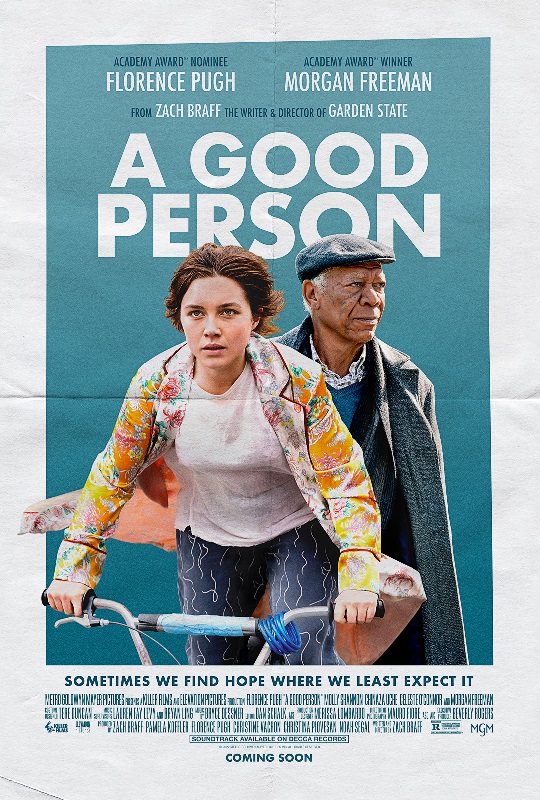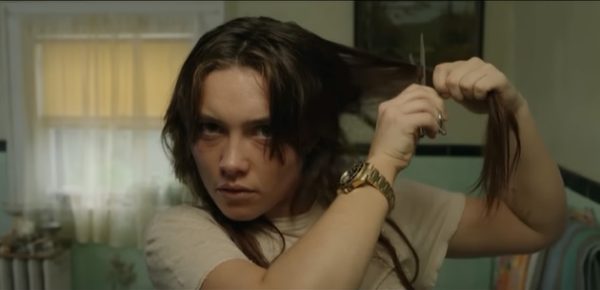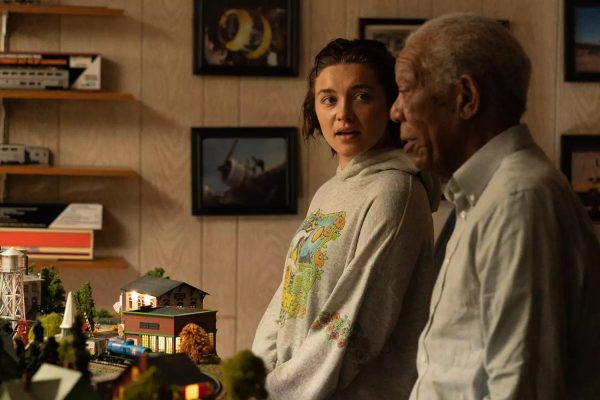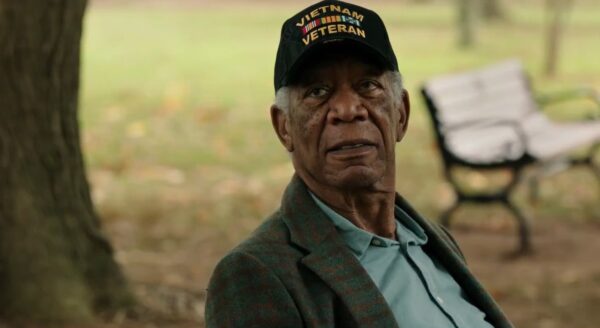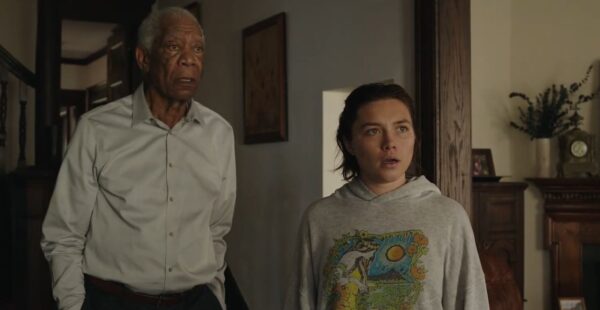Robert Kojder chats with Zach Braff about his new film A Good Person, Florence Pugh’s remarkable talent, the New Jersey Turnpike, pushing Morgan Freeman to his best performance in years, comedy breaking up heavy drama, balancing several characters and stories, shaping a character’s music taste, and more…
Perhaps best known as Dr. John Dorian across several seasons of the hit comedy series Scrubs, or voicing Chicken Little (a role he would reprise for the Kingdom Hearts video games), Zach Braff also occasionally writes and directs. As discussed in the interview below, his approach to most projects blends comedy and drama, which can be seen in Garden State, whereas Going in Style (which also starred Morgan Freeman, one of his stars here) was strictly more of a comedy.
With his latest project titled A Good Person, Zach Braff (writing and directing) has channeled personal experiences into a heavy role for his significant other at the time, Florence Pugh. Following Allison, an engaged woman that develops an Oxy addiction following an unspeakable car accident tragedy, the narrative connects several characters and plot threads for an emotionally resounding tale of forgiveness, redemption, and coming to terms with one’s past mistakes. It’s not just about how addiction can form but how others indirectly involved in a tragedy can feel pressured into relapsing.
Zach Braff recently stopped by Chicago to promote A Good Person, granting me the privilege to speak to him about a film as messy and thorny as life itself, that’s also quite devastating and powerful. Florence Pugh is astonishing, but Braff also gets the best performance out of Morgan Freeman in at least a decade. Enjoy the interview below:
Hey, how are you, Robert?
I’m good. It’s nice to meet you. And I enjoyed the movie!
Thank you so much.
I saw that you felt compelled to write and tell this story because you lost a few people close to you and always envisioned Florence Pugh starring in it. Is there something about her that reminds you about those people, or is there another reason you wrote the role of Allison for her?
That’s a good question. I wrote it for her because I’m just in awe of her talent. She’s so special and unique, and it’s like being a composer and wanting to write a great piece of music for an incredible musician. I knew if I wrote what was on my mind because of the loss I had experienced in my life, it would be something that was going to be challenging and hard for an actor to do. It would be a very difficult piece, and I knew that Florence could pull it off.
One creative decision you made that kept me engaged throughout the film is that, from the beginning, we know that Allison was looking at her phone before the car accident, I think a lesser filmmaker would save that for a cheap audience twist instead of vital character growth. So when and how did you decide to tell the audience upfront that her character was primarily at fault?
I wanted to design that specifically, that, even though she’s using her phone, she’s doing something that’s not that egregious. It’s something we all do (maps while driving). It’s not like she’s texting or on social media, but that doesn’t matter. It’s still ultimately her fault, but it takes her a long time to accept that. So I just wanted to design it in such a way that the audience could see themselves in it because if she were doing something super egregious and cavalier, I think the audience would go, “oh, well that’s, that’s so messed up, I don’t do that.” I wanted to make it something that a lot of people do.
Florence Pugh is one of the greatest actors working today. She’s constantly surprising me, whether tackling new genres, stepping into voiceover roles (Puss in Boots: The Last Wish), and now here singing, something I also didn’t know she could do, which she turns out to be fantastic at. So what’s it like having such a talented performer, front and center, that you can utilize in new and exciting ways, and were there moments where you were also surprised at what she was capable of?
That’s a great question. It was just thrilling. I hope this is not too cheesy of an analogy, but it’s the one that I feel is most accurate: I feel like I’m an orchestra conductor and get to work with the best first violinist in the world. She’s just incredible. And yeah, there are times when she surprises me. There’s that particular moment when she shares for the first time in AA that I get goosebumps thinking about it now, and I’ve seen the movie a zillion times. I remember at that moment just being at the monitor, and my jaw was on the floor. I imagined that she would beautifully deliver that, but I never imagined it would, it would be on the level.
It was just so raw and real. With Florence, you never feel for a second that someone is reading lines; you genuinely believe that these thoughts are coming to her and they’re her character’s thoughts, and that’s just the magic of a good actor. Many actors are fine and capable, but you always feel like they’re reading a script, and what makes someone next-level is that you get lost in believing that this is their character’s thoughts and they’re thinking them for the first time.
You’re also from New Jersey, so I’m curious if you have any terrifying stories from being on the New Jersey Turnpike?
[laughs] Terrible traffic! There’s a stretch of Jersey where I’m from, where it has been under construction my entire life, and every time I’m stuck in it, I joke, “when’s New Jersey gonna be done?” This has been a 47-year project. So I gave that to one of the characters to make a joke because there are areas between that bottleneck that go into Manhattan that have been under construction for at least 47 years.
Florence Pugh is outstanding in this movie; everyone will rave about her. But you also got the best performance out of Morgan Freeman in maybe a decade, if not longer.
Thank you!
I know you’ve worked with him before (Going in Style), but what do you think made him so committed to this role and powerful?
That’s a great question. I think because I had worked with him on a heist comedy together, and it was obviously a totally different genre, but we became friends. He’s very intimidating because he’s Morgan Freeman. So I think we had made a comedy together made him less intimidating; don’t get me wrong, he is still intimidating, but less so. We had a bit of banter, and I could joke with him. When he gets a bit surly, I could grab his shoulders and say, “oh, come on.” So I could push him, and I told him I would. I said, “I won’t be a wimp with you. This is tough, and I’m going to push you, and you’re not always going to love it.” And he didn’t. But, man, I agree with you. It’s the finest thing he’s turned in, in a long time, and I think he thinks so too. It’s been a second since he went all out in the way he does in this film.
Many films about addictions take themselves seriously throughout their running time. Here you have actors like Molly Shannon, who you let be funny, and even Morgan Freeman gets to be funny here sometimes. So what was your philosophy or reasoning behind peppering in those lighthearted comedic moments?
It’s what I’m drawn to, and I think it’s important as a filmmaker to, first and foremost, make the kind of films you’d want to see. If you look at all of my work, whether Scrubs, Garden State, Shrinking, or Ted Lasso, I’m drawn to a hybrid of both. Obviously, Scrubs was mostly a comedy that had dramatic moments. This is predominantly drama with comedic moments, but that’s what I’m drawn to. This story without humor would be too much. It would be overbearing. It’s like releasing steam from a radiator; the audience needs a release. Also, in the moments of my life where I’ve experienced grief, I’ve been so grateful for moments of release and humor to help me get through it.
This isn’t just a story about how addiction can start but also about how someone can relapse. We have both stories here, and these characters are on a collision course with each other. What’s the most challenging aspect of balancing those stories and ensuring you are doing justice to both of them?
That’s a good point. I had to, especially at the beginning of the film, after the prologue, where there is this intercut between Morgan’s character Daniel and his granddaughter’s life, and then Florence’s character and her mother, played by Molly Shannon’s life. There is this balance of telling each of their stories and familiarizing the audience with their current lives. And then there’s a collision where they interact and overlap. Two different families are grieving, but they’re doing it separately.
So then we build to one of my favorite scenes in the film, which is the diner scene where they finally talk, and they’re both quite guarded and trying to be tactful about how they handle this very awkward conversation. There’s a spark between those two characters and those two actors: they’re both so intrigued by the other person and really need the other person. They’re both really in search of exactly what the other person is. She’s been abandoned by her father. She has no father figure. He’s lost his daughter and has no idea how to raise a teenage girl. And here’s a young woman who’s giving him advice. That was kind of my idea in writing it: we would experience them lonely and isolated and needing help and then have them collide with one another and begin to help each other.
Since the title is A Good Person and the film has these complex characters, I’m curious, what do you think makes someone a good person?
I want to leave that up for interpretation for the audience. Certain aspects of that are objective in our society, but plenty of aspects of it are subjective. I aim to leave it as something for the audience to discuss. The only thing I’ll say about it is that I believe that the film is about good people who do have good hearts, who have fallen down, and it’s about their struggle to stand back up.
Allison is seen wearing band t-shirts of Rolling Stones, Fleetwood Mac, Nick Gave, and more. So I’m curious, how are you and Florence decided to shape the character’s taste in music?
That’s a great question. Florence came up with that with the costume designer. I let her run wild, although I was insistent on this yellow kimono silk robe because I just thought it was so cool. She, and Terry Duncan, our costume designer, came up with the idea. We know Allison loves music from the opening scene. She’s singing a Velvet Underground song. We know that she likes rock from a certain era. To this day, I have no idea how he cleared all those famous t-shirts, but someone magically made it happen in a low-budget movie. So I think it’s cool.
Do you want to discuss any upcoming projects before we part?
There’s a new show with Vince Vaughn I do as an actor for a couple of episodes called Bad Monkey. Shrinking got picked up for season two. I’m going to direct three episodes in season two. And an independent movie I made as an actor called French Girl with Vanessa Hudgens will also be coming out in the coming months.
Awesome. Thank you so much for your time. The movie is great, with amazing performances. You did a great job.
I appreciate your time. Thank you so much.
SEE ALSO: Read our review of A Good Person here
Robert Kojder is a member of the Chicago Film Critics Association and the Critics Choice Association. He is also the Flickering Myth Reviews Editor. Check here for new reviews, follow my Twitter or Letterboxd, or email me at MetalGearSolid719@gmail.com

